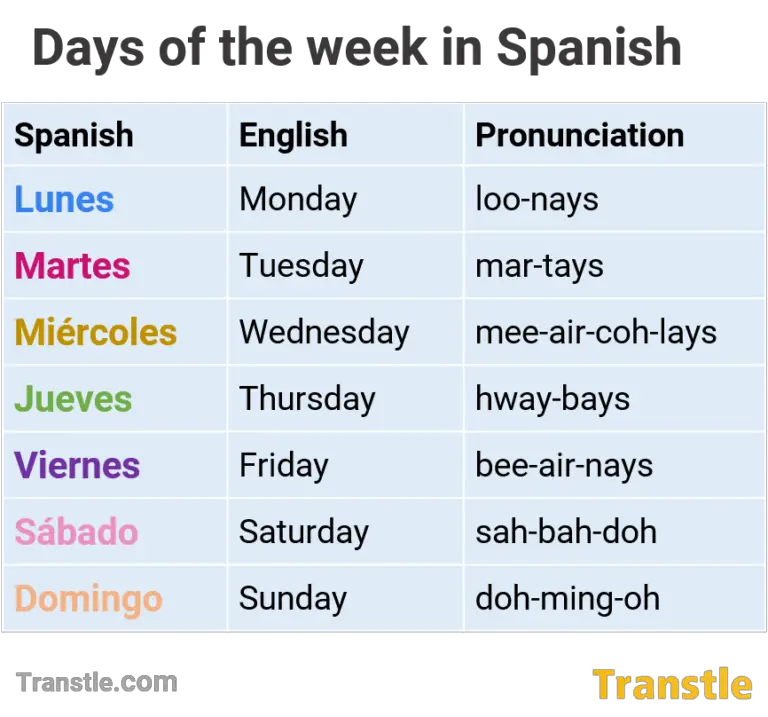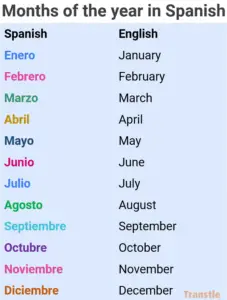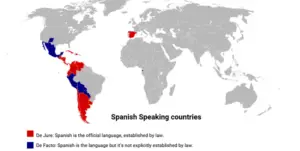Days Of The Week In Spanish

The days of the week in Spanish (Días de la semana) are essential words that are a fundamental part of everyday vocabulary. There are seven days of the week in Spanish: Lunes (Monday), Martes (Tuesday), Miércoles (Wednesday), Jueves (Thursday), Viernes (Friday), Sábado (Saturday), and Domingo (Sunday).
It’s important to note that the days of the week follow specific grammar rules, particularly in regards to using the appropriate articles when constructing a sentence. Below is an explanation of these rules.
| English | Spanish | Pronunciation |
| Monday | Lunes | loo-nays |
| Tuesday | Martes | mar-tays |
| Wednesday | Miércoles | mee-air-coh-lays |
| Thursday | Jueves | hway-bays |
| Friday | Viernes | bee-air-nays |
| Saturday | Sábado | sah-bah-doh |
| Sunday | Domingo | doh-ming-oh |
Other related words
| English | Spanish |
| Day | Día (m) |
| Week | Semana (f) |
| Days of the week | Días de la semana (m) |
| Date | Fecha (f) |
See also: Months of the year in Spanish
Grammar rules
- The days of the week in Spanish are written in lowercase, and they are capitalized only when they are the first word of a sentence.
“Mi día favorito es el sábado” (My favorite day is Saturday) is written in lowercase, while “Sábado de chicas” (Girls’ Saturday) is capitalized as it’s the first word of the sentence. |
- To express what day it is, use the phrase “Es” (it’s) followed by the day of the week.
|
- To indicate that an event has taken place or will take place on a specific day, use the definite article “El” before the day.
|
Other time expressions
| The day after tomorrow | Pasado mañana |
| The day befote yesterday | Antes de ayer |
| The next day | El día siguiente |
| The last day | El día anterior |
| The last day | El último día |
| Birthday | Cumpleaños (m) |
| Public holiday | Día festivo |
| Morning | Mañana |
| Noon | Mediodía (m) |
| Afternoon | Tarde (f) |
| Evening | Tarde (f) |
| Night | Noche (f) |
| Midnight | Medianoche (f) |
Sentences with the days of the week in Spanish
|
Quiz and exercises
Here’s a short quiz and exercise to test your knowledge of the days of the week in Spanish:
Quiz:
- What is the Spanish word for “Monday”?
- How do you write the days of the week in Spanish?
- Which article is used before the weekend days in Spanish?
- When do you capitalize the days of the week in Spanish?
- How do you say “It’s Thursday” in Spanish?
Exercise:
a. Complete the following sentences with the appropriate day of the week in Spanish:
- Hoy es ___________.
- Mañana es ___________.
- El concierto es el ___________.
- No trabajo los ___________.
- ¿Vamos al cine el ___________?
b. Translate the following sentences
- Today is Wednesday.
- What day is it tomorrow?
- My favorite day of the week is Friday.
- We have a meeting on Thursday.
- I don’t work on Saturdays and Sundays.
Answers:
- “Lunes”
- Days of the week in Spanish are written in lowercase, and they are capitalized only when they are the first word of a sentence.
- “El” is used before the weekend days in Spanish.
- The days of the week in Spanish are capitalized only when they are the first word of a sentence.
- “Es jueves.”
Exercise:
- Hoy es martes.
- Mañana es miércoles.
- El concierto es el sábado.
- No trabajo los sábados.
- ¿Vamos al cine el viernes?
Translations
- ¿Qué día es hoy?
- Mañana es lunes.
- El partido de fútbol es el sábado.
- No estudio los domingos.
- ¿Quieres ir al cine el viernes?
Read next



